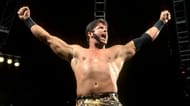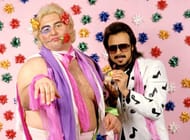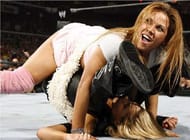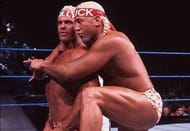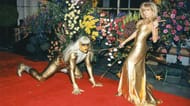Masculinist programming, over the years, has fetched the WWE sufficient notoriety to help usher itself into mainstream television relevance. While racy bra-and–panty matches and misogynistic storylines ran rampant through a good part of the 2000s, WWE has never quite broached the subject of homosexuality except through instances displaying exaggerated and uncomfortable behaviour. Any angle playing out homosexuality would immediately be marginalised as trivial, comic, or even bizarre, only to be swept under the glitzy rug of entertainment. Of course considering how a queer subculture in the WWE remained restricted to flamboyance, such alienation was symptomatic of the company’s tendency to never set a foot wrong with its target audience. For proof, one need not look further than the company’s first public acknowledgement of Pat Patterson’s sexuality in 2014, despite it being told in whispers and rumours since the 1970s.
Since Darren Young’s coming out in the most candid of circumstances in 2013, the WWE is no longer skirting the issue. Most prominently, it has renewed its associations with organisations such as GLAAD. Presently, the centralization of sexual transgression in popular culture has affected the company’s representation of itself, particularly in lieu of its numerous efforts at inclusivity. Young has become an unofficial spokesperson in homosexual circles and while this openness needs to be lauded, one cannot help but notice an instinct,on the part of the company, to stay on course despite shifting terrains.
However, there has not been any further implementation of homosexual storylines in contemporary WWE programming, despite all the talk by management. It remains to be seen if queer portrayals actually occur down the line, and supposing they do whether they are tweaked for entertainment value or underscored for social relevance.
WWE has no plans for these former AEW wrestlers? Here's why!
This is not an exhaustive list.
5: Rico’s career was tempered with homosexual undertones
Rico made his debut as a stylist for Billy and Chuck in 2003. A suave character drawn in the same homoerotic vein as the tag team he styled, Rico brought a slew of entertaining moments to the mix through his goofiness outside the ring and grappling skills inside. He managed Billy and Chuck till their infamous wedding when he jumped ship to Raw by assaulting Chuck after Eric Bischoff had sabotaged their elaborate matrimonial set up (which was coincidentally planned by GLAAD).
Now sporting sideburns and face paint, Rico maintained the exótico essence while alternating between managerial jobs and ring performances. He began stretching his gay character for cartoonish effect, a move that soon endeared him to the audience.
By 2004, Rico had adopted a personality, not unlike Adrian Street. He would kiss his opponents mid-match, grab their behind, or turn a bear hug into a seductive embrace to the utter disgust of his opponents and mirth of the spectators. Often, they would be so flustered as to not enter the ring, thus earning Rico a win through being counted out.
Described as a “metrosexual” by Josh Matthews, Rico was not only a showman who squared his over the top gimmick seamlessly but was also an incredibly talented in-ring performer. Sadly, his limited tag team championship runs did nothing to propel him beyond the stock comic relief that he had morphed into during his latter days.
4: Adrian Adonis’s change of gimmick
In the 1980s, the WWE was rife with minority stereotyping and paper thin caricatures which were fashioned to represent the immorality inside a society waiting to be salvaged. The period was particularly notorious for its insecurities concerning homosexuality and the supposed threat it posed to the masculine persona. Adrian Adonis’s transformation from a leather jacket clad, rough-edged biker into a flamboyant, garish, chubby performer was a talking point for audiences and commentators alike, who could not help but project hate and disgust for the feminine mannerisms which the character espoused.
Taking a cue from Gorgeous George’s showmanship and shooting it to extreme levels, “Adorable” Adrian Adonis would often imitate the former’s overdone theatricality. He was accompanied to the ring by his manager Jimmy Hart, who was instrumental in creating this persona. “We just wanted to make sure he was flamboyant.", said Jimmy Hart, discounting any indications of Adonis’s purported sexuality. Nonetheless, effeminacy and gaudy, pink attire were enough fodder for homophobia to take shape around the WWE ring, making “The Adorable One” one of the most talked about performers during his time.
Adonis was fired from the company after his feud with Brutus Beefcake ended in 1987. Speculations abound that it was his refusal to work out that invited Vince’s resentment for him and finally, got him to leave the WWE.
3: Mickie James’s stalker angle with Trish Stratus
Mickie James came to the WWE in 2005 from TNA, where she used to perform under the name Alexis Laree. Her first gimmick in the company involved a stalker angle with then WWE Women’s Champion, Trish Stratus. As an obsessed fan, Mickie’s relationship with Trish snowballed into one of the most iconic feuds in the Women’s division. Initially, a self-sacrificing subject who was not shy of adopting Trish’s mannerisms, Mickie ensured that the latter’s run as champion never dipped beyond a mark. On a backstage segment of the December 26, 2005 edition of Raw, Mickie ended up kissing Trish under a mistletoe sprig, throttling her storyline from a fan’s fascination to a lover’s obsession.
Mickie’s character then took a sinister turn as the feud progressed. A match between the two at New Year’s Revolution, 2005 was supposed to ease Trish’s strings but Mickie was not contented. When Trish spurned her enamoured declarations, Mickie turned violent. Her character transformed into a mania driven, delirious individual whose unreasonableness in dealing with other wrestlers often left the champion terrified.
Memorably, the two faced off at Wrestlemania XXII in one of Trish’s last matches with the company. Replete with sexual hints, the most brazen of these was an unscripted act of Mickie insinuating sexual overtures after having grabbed Trish’s groin. Mickie went on to win the match, deserving in her own right to be crowned the new WWE Women’s Champion and seeing the feud to its illustrious end.
2: Billy and Chuck’s entire act
From a cowboy to a man fixated on his own behind to one-half of an ostentatiously homoerotic tag team, Billy Gunn has portrayed variegated characters which were in equal parts ridiculous and amusing. An industry veteran by 2003, Billy was paired opposite former WCW Tag Team Champion Chuck Palumbo in an act called “Billy and Chuck”.
The pair started growing affectionate towards one another, with Chuck even dyeing his hair bleach blonde to match Billy’s. They began sporting matching red bandanas and tights, consequently drawing fire from their crafty stylist/manager Rico for being too unsophisticated. Despite their inclinations, a general ambiguity underscored their relationship. This created spots for homoerotic comedy both inside the ring and backstage. With skits such as provocative posedowns with women wrestlers, locker room intrusions and corny displays of fondness, the team continued to inflate their sexual tendencies. The incongruity of these entertained many a fan in 2002, not only because of a latent homophobia which they seemed to play off, but also the blunt stereotyping which they demonstrated at every turn.
However, all speculation was put to rest when Chuck proposed to Billy for life partnership, which the latter happily accepted. The wedding, scheduled to take place on September 12, 2002, and promoted extensively by GLAAD, however, turned out to be an act that apparently “wasn’t supposed to go this far”. Right before the minister could finish reading his pronouncement, Billy and Chuck stopped him and yelled at Rico for not drawing the line where he was supposed to. Of course, it went on to be sabotaged by Eric Bischoff and the 3-Minute Warning, aided by a defecting Rico.
The two-time Tag Champions were stranded in the ring with the hollowness of their act showing prominently. GLAAD did not take kindly to the incident, particularly when they had vested hopes on the WWE’s treatment of a homosexual wedding. Seeing how the company had led them to secure mainstream media coverage for the angle under false pretences, GLAAD denounced the WWE for deception. As for Billy and Chuck, the pair soon separated after Billy Gunn suffered a legitimate shoulder injury during a match, with each man stealthily walking back to their respective singles careers.
1: Goldust’s intentional ambiguity about his character
It was in May 1997 that the WWE character called Goldust revealed to the world his identity as second generation wrestler, Dustin Runnels. For a year and a half before that, he had been consistently portraying an enigmatic, bizarre, and sexually ambiguous heel whose mannerisms and fetish outfits never failed to draw responses from an irate, heated crowd. Though never explicitly called homosexual throughout his long tenure, Goldust achieved notoriety for his flirtatious and titillating in-ring behaviour. Chiefly used to distract and unsettle opponents, Goldust’s antics included mind games through delirious stalking, groping, cuddling, suggestively crawling over an immobilised opponent to hover around their mouth, and in one instance with Ahmed Johnson, settling for a kiss.
In an interview with Kayfabe Wrestling Radio in July, 2012, Runnels iterated how Vince McMahon had used the term “androgynous” while discussing the character for the first time. The period was 1995 and WWE was slowly slipping into a turf war with rival promotion WCW. The conception of a character as controversial as Goldust was only proper in such a case where the company sought to spike its television ratings. Having fallen out with his father Dusty Rhodes who was working in WCW then,Runnels had just had a child with Marlena (Terri Runnels) and was looking for a job. Perhaps with a gimmick as brazen as this, the WWE sought to take a dig at Dusty and correspondingly, WCW.
There have been instances when Goldust has denied any charge of stock homoerotic behaviour. Besides the introduction of Marlena as his valet/lover, the probability of it being a psychological ploy also discounts such claims. Once a movie and gold guzzling drag artist, Goldust has, especially since the late 2000s, shrunk into a residue of his previously salacious self. Despite his over the top mannerisms, his contribution to the company’s success is unparalleled. An incomparable ring worker, dedicated to his craft and daring in his endeavours, Goldust was perhaps one of the truest embodiments of the impudence which WWE of the late 90s sought to impart into itself.
For the latest WWE news, live coverage and rumours, visit our Sportskeeda WWE section.
How WWE has messed up John Cena's last run - Check here!
